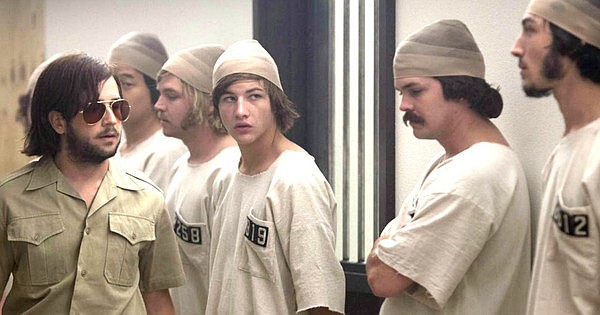- April 25, 2024
-
-
Loading

Loading

In 1971, psychology professor Dr. Philip Zimbardo conducted an experiment that had a disturbing outcome. It was created to analyze "the effects that prisons can have on human behavior." "The Stanford Prison Experiment" chronicles the study, which was scheduled to have lasted two weeks. It came to an abrupt halt in six days.
Twenty-four college students were selected out of 75 applicants. A mock prison was set up in which participants would portray either guards or prisoners. Ironically, all preferred to be prisoners. Each admitted that their willingness to take part was financially motivated. That amount was $15 per day.
Dr. Zimbardo (Billy Crudup) assembled a group of colleagues and one former San Quentin inmate to constantly monitor the subjects via surveillance cameras. Rule No. 1: no physical assaults were allowed. He does, however, allow for potentially stripping away the prisoner's individuality by making them wear dresses. By removing "all the things that make them "them," Zimbardo hopes that the loss of freedom, literally and symbolically, will glean vast insight into behavioral changes.
And that they do. The guards attired in uniforms and menacing aviator sunglasses carry nightsticks, which they begin to love cracking. One likens himself to the guard in "Cool Hand Luke" to the point of speaking in a threatening redneck drawl. Even Zimbardo gets caught up in the role playing, becoming emotionally disconnected as conditions dangerously deteriorate between guards and inmates. When his wife finally observes the sadistic behavior escalating, she manages to help Zimbardo in retrieving his erroding conscience.
Director Kyle Patrick and screenwriter Tim Talbott have created a film that is unpleasant to watch and, yet, impossible to turn a blind eye. The pace at which the degradation of both prisoners and guards escalates is terrifying. And when the role playing morphs into uncontrollable reality, it shakes the very foundation upon which we perceive ourselves as human beings.
"The Stanford Prison Experiment" is an exercise in how absolute power corrupts absolutely. But it's also a warning that left to our own devices, the line between right and wrong can become so blurred that it ceases to exist.